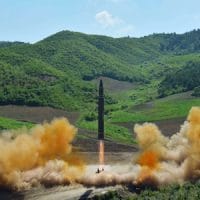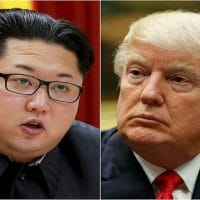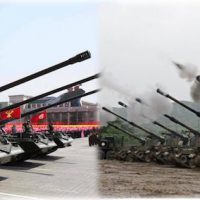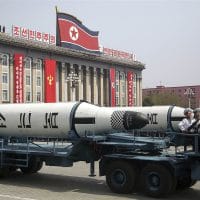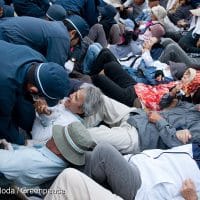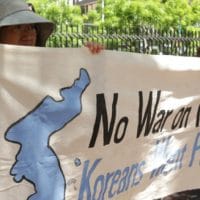-
The Pentagon is preparing a new war in South-East Asia
You are probably aware that you are incompletely informed about what is brewing in Myanmar, and you probably haven’t heard about the military coalition that is preparing to attack that country. Don’t take sides before you read this article and digest the information.
-
Beating the drum for a “good” nuclear war with North Korea
United Nations Ambassador Nikki Haley has proven herself to be one of the most hawkish U.S. representatives to the UN, likely a reflection of the increasingly hawkish veer of the U.S. President Donald Trump, who had originally campaigned on anti-interventionism.
-
A lost document from the Cold War
This article covers the first substantive Internet posting and analysis of a unique Cold War document, the “Report of the International Scientific Commission for the Investigation of the Facts Concerning Bacterial Warfare in Korea and China.”
-
Bernard D’Mello on revolution in the global south
From the time of independence in 1947, India has had the resources and the potential to achieve a high level of human development—yet the great majority of the country’s people have remained desperately poor.
-
An interview with Timir Basu on the 50th anniversary of the Naxalbari Uprising
This year marks the fiftieth anniversary of the outbreak of the “Naxalite” revolutionary peasant uprising in northern India, named for the locale in which it first appeared, Naxalbari. What follows is an interview with a prominent Bengali intellectual who recalls his youthful foray into the countryside to organize poor peasants.
-
North Korea keeps saying it might give up its nuclear weapons – but most news outlets won’t tell you that
Starting on July 4, North Korea has been saying over and over again that it might put its nuclear weapons and missiles on the negotiating table if the United States would end its own threatening posture.
-
U.S. wages cyberwar abroad under cover of ‘activism’
Like many other episodes of extraterritorial political interference up to and including military intervention, America’s meddling in Thailand is done on behalf of corporate interests seeking to expand their respective and collective hegemony both regionally in Asia vís-a-vís Beijing, and globally.
-
U.S.-N. Korean conflict: impotent fury?
The Trump presidency in its first two hundred days has rattled U.S. imperialist strategists, going from one blunder to another. Trump’s bluster of “fire and fury” against North Korea has further complicated this dangerously spiraling conflict.
-
War with North Korea cannot be contained but must be prevented
Peace is possible on the Korean Peninsula. If the planet is to survive, there is no other choice.
-
Twenty years after the Asian financial crisis
The hegemony of international finance capital, which led to economies “opening” themselves up to the vortex of global financial flows, demolished both Nehruvian dirigisme and East Asian neo-mercantilism. And the same hegemony has now brought the world capitalist economy to a crisis from which it is in no position to recover.
-
North Korea’s “not quite” ICBM can’t hit the lower 48 states
The flight tests on July 4 and 28 were a carefully choreographed deception by North Korea to create a false impression that the Hwasong-14 is a near-ICBM that poses a nuclear threat to the continental U.S.
-
Remembering the Gulf of Tonkin, and the consequences of wanting to believe
Americans, Schanberg said, are “the ultimate innocents. We are forever desperate to believe that this time the government is telling us the truth.”
-
Why the United States did not demonstrate the bomb’s power, ahead of Hiroshima
Would non-use at the end of a brutal total war have created a taboo against the use of nuclear weapons as strong as resulted from the demonstrated horror of their effects against the two Japanese cities? Perhaps not.
-
Fighting fascism
Today will be remembered as the day the resistance to dictatorship was reborn. Future generations will look to the assembly here today and say, yes, there were people who were not intimidated by the popularity of an authoritarian personality and placed themselves in the line of fire to prevent the advent of a full-blown dictatorship.
-
Prabhat Patnaik on contemporary capitalism and the shape it takes in India
I think Marxism analyses the contemporary world in a way which nobody else did. Lenin had said the strength of Marxism lies in the fact that it is true. The point is that it is a genuine scientific discovery.
-
Land grabs and uneven development in Cambodia
The global labor arbitrage means the only competitive “advantage” available to most countries is forcing workers to accept slave wages and environmental standards low enough to lure in multinationals. If the population resists, the only means available to diffuse it is brutal repression.
-
Fighting for Okinawa
Our story though, is much more than three short paragraphs in a textbook. It is a story about a people’s determination for sovereignty in the face of imperialism, resilience in midst of colonization, and perseverance for peace as survivors of war. Our story is urgent and it is a call for global action in the name of peace and justice. The history of Okinawa is a story of resistance but also a call to the world.
-
Maize, rice, wheat: alarm at rising climate risk to vital crops
No one likes to think about how extreme weather events could devastate food production which could cause global panic and disaster. However, scientists, led by Chris Kent, of the Met Office, focused their initial efforts on how extreme weather would affect maize, one of the world’s most widely grown crops. Along with maize other staple crops could be affected including those of rice, wheat and soya beans.
-
Toilet tales
Kakkoos (Latrine) is a Tamil documentary that is a powerful indictment of society’s apathy towards the thousands who are tasked with cleaning public toilets and sewers. The filmmaker Divya Bharathi talks about why she made a documentary and what is the task at hand, post its tremendous success.
-
The need for a new U.S. foreign policy toward North Korea
USA-North Korean relations remain very tense even though the threat of a new Korean War has receded. Yet the U.S. government remains determined to tighten economic sanctions on North Korea and continues to plan for a military strike aimed at destroying the country’s nuclear infrastructure.






